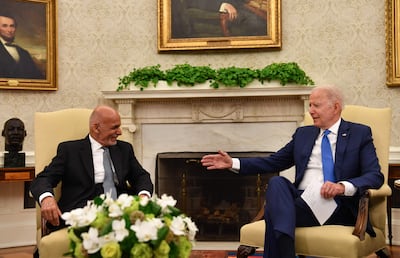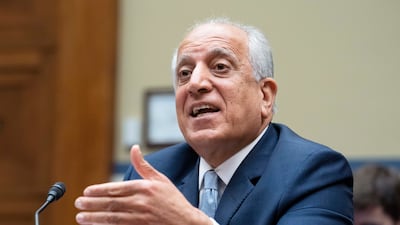Congressional leaders on Thursday accused Zalmay Khalilzad, the former US special representative for Afghanistan reconciliation, of being at the centre of a “naive” approach to the Taliban in the run-up to the withdrawal from America's longest war.
At a Republican-led House of Representatives Foreign Affairs Committee hearing meant to further scrutinise President Joe Biden and his administration for the 2021 US withdrawal from Afghanistan, Mr Khalilzad's tenure as lead Taliban negotiator under former president Donald Trump also faced criticism.
Keith Self, a Republican, called it “naive to think the Taliban was ever going to live up to anything”.
“Over a span of 20 years dealing with a region, this entire process that we've heard today is extremely naive, and, sir, I find you in the middle of it,” Mr Self told Mr Khalilzad.
Mr Khalilzad joined Mr Trump's administration in 2018 and became responsible for dealing directly with the Taliban, who had refused to engage with the Afghan government. He left the State Department in the weeks after the Afghanistan withdrawal.
Under Mr Trump, he was instrumental in forging the Doha Agreement between the US and the Taliban in 2020, which kick-started the withdrawal.
Per the deal, in exchange for the withdrawal of US forces by the summer 2021, the Taliban gave assurances that they would not attack US and allied targets or allow territory under their control to be used for attacks.
Democrat Kathy Manning said she was “shocked” by the 2020 deal and accused Mr Khalilzad of playing a hand in the Taliban's victory, saying they “gave up all the leverage” with the landmark agreement.
Ms Manning particularly emphasised the deal's failure to include any conditions on the status of women.
“I certainly cannot see any protection of Afghan women and girls [in the Doha Agreement] … Apparently, the protection of women and girls was not important to President Trump,” Ms Manning said.
Mr Khalilzad argued that the status of women in Afghanistan was meant to be included in US-supported, intra-Afghan negotiations after a withdrawal and the establishment of a shared government.
“The key issue for you and for our other leaders is whether achieving the goals that you outline on women should have been a precondition or withdrawal … there are lots of violations of human rights around the world, and it's not just the responsibility of the US forces,” Mr Khalilzad said.

But Ms Manning interjected: “We're talking about half the population of the country.”
The goal of a shared government scenario in Afghanistan unravelled with the fleeing of former Afghan president Ashraf Ghani following the Taliban takeover of Kabul.
Mr Khalilzad repeatedly emphasised that the ultimate blame for the demise of American goals in a postwar Afghanistan rested with Mr Ghani's government.
“I will put the responsibility for what happened largely on the shoulders of the Afghan government leadership for not standing for their government, for their system and for the values that they said they had,” he told the committee.
But he conceded that Washington's calculations were clearly wrong on the direction a postwar Afghanistan would take.
“The assumption was, it turned out to be wrong, that the government would not collapse, that it would have more forces, weapons, more international standing, more money,” he said.
Mr Khalilzad has previously said that he believes Washington did not put enough pressure on Mr Ghani to share power with the Taliban.
The Doha deal left “the future of Afghan women completely up to the outcomes of the intra-Taliban negotiations and battlefield developments”, the Brookings Institution noted.
In a 2020 analysis on the Doha deal after its announcement, Brookings contributors wrote: “Long gone are the days when the George W Bush administration embraced women’s rights and empowerment of women as a justification for its war on the Taliban.”











































































